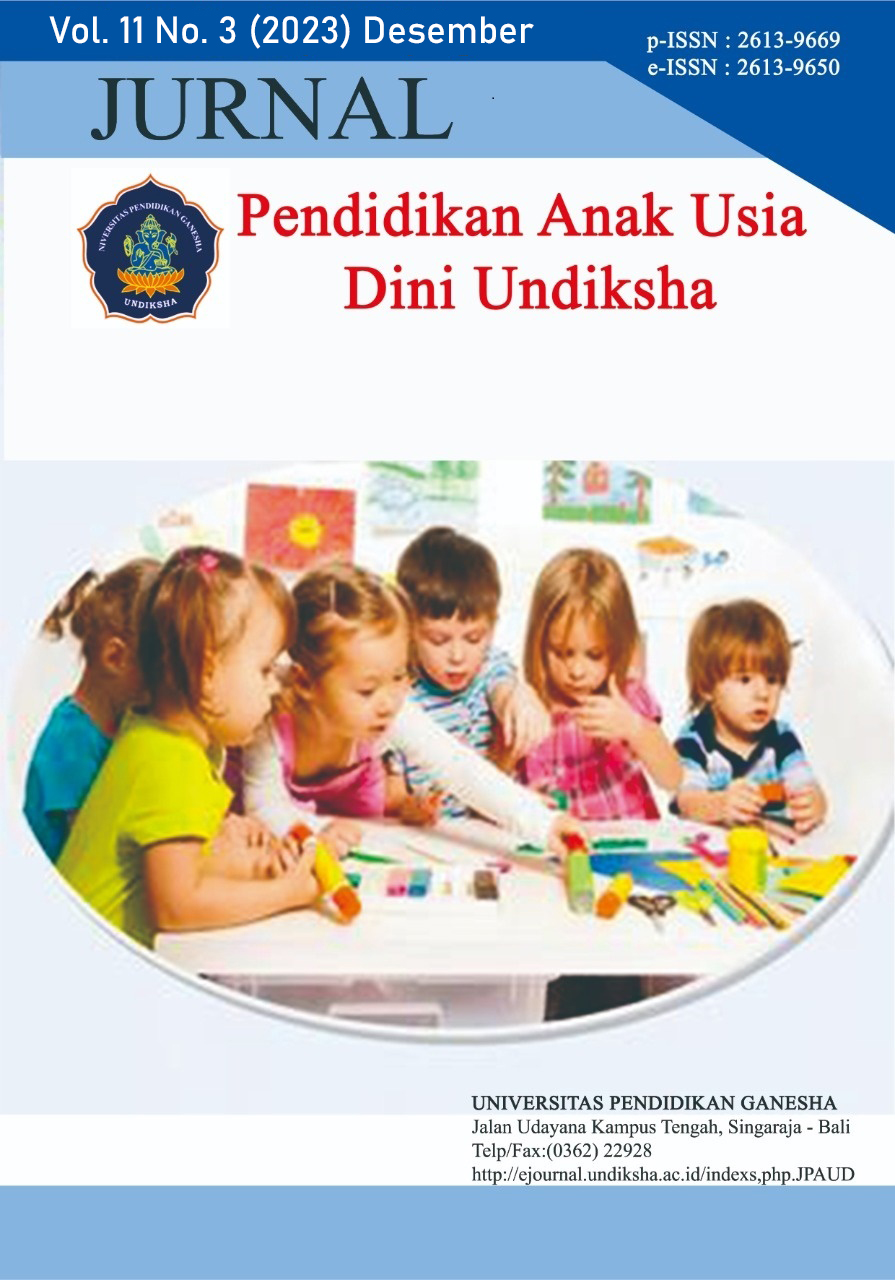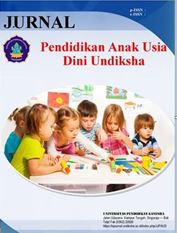Educator Professionalism Development: A Review of Kindergarten Teachers' Perspectives
DOI:
https://doi.org/10.23887/paud.v11i3.62067Keywords:
Profession, Professionalism, Professionalism Development, Early Childhood EducatorAbstract
Professional development is mandatory for educators who have completed their educational qualifications. This aims to ensure that educators can continue to improve their knowledge and skills by changing times, which, of course, have an influence on the world of education. The research aims to analyze professional development at the educator level for kindergarten-age children. Quantitative approach with a cross-sectional survey design type. Data collection was carried out by distributing questionnaires in form. The research subjects consisted of 43 respondents. Data analysis was carried out using statistics. The research results show that of the various types of professional development programs, many teachers participate in training, workshops, educational conferences, and seminars. These two types of programs fulfill a lot of knowledge and skills. Even though teachers have obstacles in developing professionalism, such as time, funds, and suitability of training materials to their needs, they still try to do it with their desires. Support from education unit leaders and the impact on their competencies felt after participating in the development program are other factors in implementing the development of educational professionalism. The implication is that professional development program organizers need to carefully consider various things so that more educators can participate in the programs provided, including analyzing the knowledge and skills teachers need.
References
Ajani, O. A. (2020). Teachers’ Professional Development in South African High Schools: How Well Does It Suit Their Professional Needs? African Journal of Development Studies (Formerly AFFRIKA Journal of Politics, Economics and Society), 10(3), 59–79. https://doi.org/10.31920/2634-3649/2020/10n3a4. DOI: https://doi.org/10.31920/2634-3649/2020/10n3a4
Aprilina Tarigan, M. (2020). Pengaruh Profesionalisme Terhadap Kinerja Guru Smp Negeri 6 Percut Sei Tuan. Jurnal Kepemimpinan Dan Pengurusan Sekolah, 5(1), 43–48. https://doi.org/10.34125/kp.v5i1.462. DOI: https://doi.org/10.34125/kp.v5i1.462
Avalos, B. (2011). Teacher professional development in Teaching and Teacher Education over ten years. Teaching and Teacher Education, 27(1), 10–20. https://doi.org/10.1016/j.tate.2010.08.007. DOI: https://doi.org/10.1016/j.tate.2010.08.007
Basri, D., & Suryana, D. (2023). Analisis Tantangan dan Strategi Pengembangan Profesionalisme Guru Prasekolah. Jurnal Obsesi : Jurnal Pendidikan Anak Usia Dini, 7(1), 709–718. https://doi.org/10.31004/obsesi.v7i1.4126. DOI: https://doi.org/10.31004/obsesi.v7i1.4126
Bayly, B. L., Dizon, E., Shrestha, G., Smith, C. L., Tekle, S., & Rhoades Cooper, B. (2020). Leveraging self-determination theory to understand which preschool teachers benefit most from a professional development intervention. Journal of Early Childhood Teacher Education, 43(2), 1–19. https://doi.org/10.1080/10901027.2020.1818652. DOI: https://doi.org/10.1080/10901027.2020.1818652
Brown, C. P., & Englehardt, J. (2016). Conceptions of and early childhood educators’ experiences in early childhood professional development programs: A qualitative metasynthesis. Journal of Early Childhood Teacher Education, 37(3), 216–244. https://doi.org/10.1080/10901027.2016.1204574. DOI: https://doi.org/10.1080/10901027.2016.1204574
Cherrington, S., & Thornton, K. (2013). Continuing professional development in early childhood education in New Zealand. Early Years: An International Research Journal, 33(2), 119–132. https://doi.org/10.1080/09575146.2013.763770. DOI: https://doi.org/10.1080/09575146.2013.763770
Chiu, T. K. F., & Churchill, D. (2016). Adoption of mobile devices in teaching: changes in teacher beliefs, attitudes and anxiety. Interactive Learning Environments, 24(2), 317–327. https://doi.org/10.1080/10494820.2015.1113709. DOI: https://doi.org/10.1080/10494820.2015.1113709
Coolahan, J. (2002). Teacher education and the teaching career in an era of lifelong learning. Education, 2(2), 39. https://doi.org/10.1787/226408628504. DOI: https://doi.org/10.1787/226408628504
Cotton, L. (2013). “It’s just more in the real world really”: how can a local project support early years practitioners from different settings in working and learning together? Early Years, 33(1), 18–32. https://doi.org/10.1080/09575146.2011.642850. DOI: https://doi.org/10.1080/09575146.2011.642850
Creswell, J. W. (2002). Educational Research. Planning, Conducting and Evaluating Quantitative and Qualitatitve Research (Vol. 21, Issue 1). Pearson.
Deci, E. L., & Ryan, R. M. (2000). Kk Verildi Dışşsal Ing Kaynak. Psychological Inquiry, 11(4), 227–268. https://doi.org/10.1207/S15327965PLI1104. DOI: https://doi.org/10.1207/S15327965PLI1104_01
Deci, E. L., & Ryan, R. M. (2008). Self-determination theory: A macrotheory of human motivation, development, and health. Canadian Psychology, 49(3), 182–185. https://doi.org/10.1037/a0012801. DOI: https://doi.org/10.1037/a0012801
Dunst, C. J., Bruder, M. B., Maude, S. P., Schnurr, M., Van Polen, A., Clark, G. F., Winslow, A., & Gethmann, D. (2019). Professional Development Practices and Practitioner Use of Recommended Early Childhood Intervention Practices. Journal of Teacher Education and Educators, 8(3), 229–246. https://doi.org/10.5539/ies.v13n9p36. DOI: https://doi.org/10.5539/ies.v13n9p36
Dyment, J. E., Davis, J. M., Nailon, D., Emery, S., Getenet, S., McCrea, N., & Hill, A. (2014). The impact of professional development on early childhood educators’ confidence, understanding and knowledge of education for sustainability. Environmental Education Research, 20(5), 660–679. https://doi.org/10.1080/13504622.2013.833591. DOI: https://doi.org/10.1080/13504622.2013.833591
Emda, A. (2017). Strategi Peningkatan Kinerja Guru Yang Profesional. Lantanida Journal, 4(2), 111. https://doi.org/10.22373/lj.v4i2.1883. DOI: https://doi.org/10.22373/lj.v4i2.1883
Eroglu, M., & Kaya, V. D. (2021). Professional development barriers of teachers: a qualitative research. International Journal of Curriculum and Instruction, 13(2), 1896–1922.
Fonsén, E., & Ukkonen-Mikkola, T. (2019). Early childhood education teachers’ professional development towards pedagogical leadership. Educational Research, 61(2), 181–196. https://doi.org/10.1080/00131881.2019.1600377. DOI: https://doi.org/10.1080/00131881.2019.1600377
Gaudin, C., & Chaliès, S. (2015). Video viewing in teacher education and professional development: A literature review. Educational Research Review, 16(7), 41–67. https://doi.org/10.1016/j.edurev.2015.06.001. DOI: https://doi.org/10.1016/j.edurev.2015.06.001
Hunsu, N. J., Adesope, O., & Bayly, D. J. (2016). A meta-analysis of the effects of audience response systems (clicker-based technologies) on cognition and affect. Computers &Education. DOI: https://doi.org/10.1016/j.compedu.2015.11.013
Jambi, U. (2019). Development of E-Modules Based on Local Wisdom in Central Learning Model at Kindergartens in Jambi City. European Journal of Educational Research, 8(4), 1137–1143. https://doi.org/10.12973/eu-jer.8.4.1137. DOI: https://doi.org/10.12973/eu-jer.8.4.1139
Knowles, M. S., Iii, E. F. H., & Swanson, R. A. (2005). The adult learner. The definitive classic in adult education and human resource development. Elsevier. DOI: https://doi.org/10.4324/9780080481913
Kusumaningrum, D. E., Sumarsono, R. B., & Gunawan, I. (2020). Pengaruh Kepemimpinan Pembelajaran, Kepemimpinan Perubahan, Kepemimpinan Spiritual, Budaya Sekolah, dan Etika Profesi terhadap Kinerja Mengajar Guru. Jurnal Manajemen Dan Supervisi Pendidikan, 4(3), 198–219. https://doi.org/10.17977/um025v4i32020p198. DOI: https://doi.org/10.17977/um025v4i32020p198
Lazzari, A., Picchio, M., & Musatti, T. (2013). Sustaining ECEC quality through continuing professional development: systemic approaches to practitioners’ professionalisation in the Italian context. Early Years. https://doi.org/10.1080/09575146.2012.758087. DOI: https://doi.org/10.1080/09575146.2012.758087
Mackay, M. (2017). Professional development seen as employment capital. Professional Development in Education, 43(1), 140–155. https://doi.org/10.1080/19415257.2015.1010015. DOI: https://doi.org/10.1080/19415257.2015.1010015
Manggioli. (2004). Pengembangan Profesi Guru. Alfabeta.
Matsui, G. (2021). Reflection on the Professional Development of Early Childhood Education and Care Teachers in Japan Based on Children’s Voices. International Journal of Early Childhood, 53(3), 367–384. https://doi.org/10.1007/s13158-021-00306-7. DOI: https://doi.org/10.1007/s13158-021-00306-7
Newman, N., & Newman, D. (2021). Leadership behind masked faces: from uncertainty to resilience at a Jamaican academic library. The Journal of Academic Librarianship, 47(5), 102377. https://doi.org/10.1016/j.acalib.2021.102377. DOI: https://doi.org/10.1016/j.acalib.2021.102377
OECD. (2010). Encouraging Quality in Early Childhood Education and Care. research brief: working conditions matter (pp. 1–8).
OECD. (2019). Review of the 1998 OECD Recommendation Concerning Effective Action Against Hard Core Cartels (Issue DAF/COMP(2019)13, pp. 1–109).
Ondi, S., & Aris, S. (2010). Etika Profesi Keguruan. Rafika Aditama.
Pangestika, R. R., & Alfarisa, F. (2015). Pendidikan Profesi Guru (PPG): Strategi Pengembangan Profesionalitas Guru dan Peningkatan Mutu Pendidikan Indonesia. Prosiding Seminar Nasional, 1995, 671–683.
Rahmayanti, R., Haryati, T., Miyono, N., & Safitri, A. (2021). Pengaruh Kompetensi Profesional, Motivasi Kerja dan Disiplin Kerja terhadap Kinerja Guru Sekolah Menengah Atas Negeri se-Kabupaten Pemalang. Jurnal Manajemen Pendidikan: Jurnal Ilmiah Administrasi, Manajemen Dan Kepemimpinan Pendidikan, 3(1), 43–55. https://doi.org/10.21831/jump.v3i1.35791. DOI: https://doi.org/10.21831/jump.v3i1.35791
Riastini, P. N. (2021). Barriers to Elementary School Teachers’ Professional Practice: Teachers’ Voice. Ilkogretim Online- Elementary Education Online, 20(1), 1086–1097. https://doi.org/10.17051/ilkonline.2021.01.101. DOI: https://doi.org/10.17051/ilkonline.2021.01.101
Rojhe, K. C., & Sulochna. (2013). Quality education and teacher development. Journal of Social Science & Humanities, 1(14), 170–174. https://doi.org/10.1080/0332331960150107. DOI: https://doi.org/10.1080/0332331960150107
Ryan, R. M., & Deci, E. L. (2017). Self‑determination theory an introduction and overview. In Self-Determination Theory: Basic Psychological Needs in Motivation, Development, and Wellness. DOI: https://doi.org/10.1521/978.14625/28806
Salmawati, Rahayu, T., & Lestari, W. (2017). Kontribusi Kompetensi Pedagogik , Kompetensi Profesional dan Motivasi Kerja terhadap Kinerja Guru Penjasorkes SMP di Kabupaten Pati. Journal of Physical Education and Sports, 6(18), 198–204. https://doi.org/10.15294/JPES.V6I2.17397.
Tanang, H., Djajadi, M., Abu, B., & Mokhtar, M. (2014). Challenges of Teaching Professionalism Development: A Case Study in Makassar, Indonesia Reasoning Skill in Mathematics Problem Solving View project Geometric Thinking View project. Journal of Education and Learning, 8(2), 132-143. DOI: https://doi.org/10.11591/edulearn.v8i2.215
Ukkonen-Mikkola, T., & Fonsén, E. (2018). Researching Finnish Early Childhood Teachers’ Pedagogical Work Using Layder’s Research Map. Australasian Journal of Early Childhood, 43(4), 48–56. https://doi.org/10.23965/AJEC.43.4.06. DOI: https://doi.org/10.23965/AJEC.43.4.06
Urban, M., Cardini, A., Guevara, J., Okengo, L., & Romero, R. F. (2019). Early Childhood Development Education and Care : The Future is What We Build Today. T20 Japan.
Yusutria. (2017). Profesionalisme Guru Dalam Meningkatkan Kualitas Sumberdaya Manusia. Jurnal Curricula, 2(1), 39–46. DOI: https://doi.org/10.35316/jpii.v2i1.61
Zainal, A., & Elham, R. (2007). Pengembangan Profesi. Remaja Rosdakarya.
Downloads
Published
How to Cite
Issue
Section
License
Copyright (c) 2023 Rohita

This work is licensed under a Creative Commons Attribution-ShareAlike 4.0 International License.
Authors who publish with the Jurnal Pendidikan Anak Usia Dini Undiksha agree to the following terms:
- Authors retain copyright and grant the journal the right of first publication with the work simultaneously licensed under a Creative Commons Attribution License (CC BY-SA 4.0) that allows others to share the work with an acknowledgment of the work's authorship and initial publication in this journal.
- Authors are able to enter into separate, additional contractual arrangements for the non-exclusive distribution of the journal's published version of the work (e.g., post it to an institutional repository or publish it in a book), with an acknowledgment of its initial publication in this journal.
- Authors are permitted and encouraged to post their work online (e.g., in institutional repositories or on their website) prior to and during the submission process, as it can lead to productive exchanges, as well as earlier and greater citation of published work. (See The Effect of Open Access)












